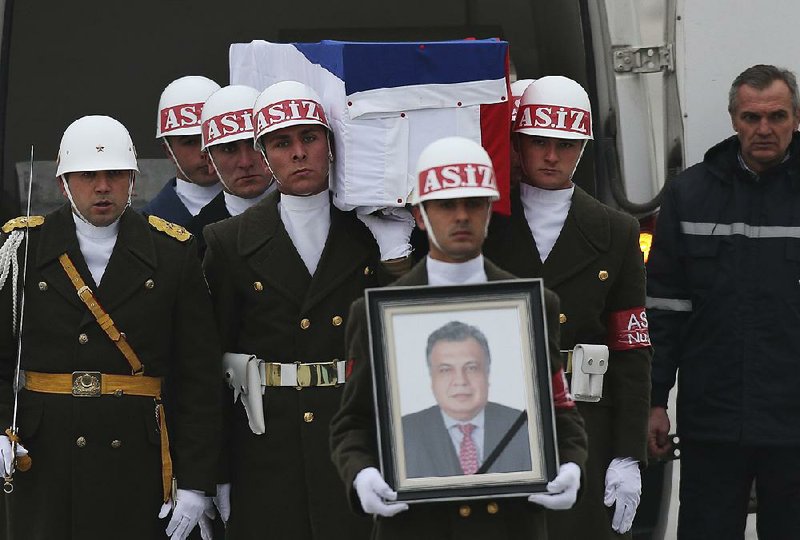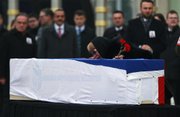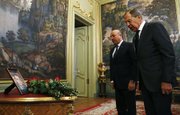ANKARA, Turkey -- Investigators from Turkey and Russia hunted for clues Tuesday in the assassination of Russia's ambassador to Turkey, who was shot in front of stunned onlookers at a photo exhibition in Ankara.
A team of 18 Russian investigators and foreign ministry officials arrived in Turkey and began inspecting the art gallery where the shooting of Andrei Karlov took place.
Central to the joint Turkish-Russian investigation is whether Mevlut Mert Altintas, 22, a member of Ankara's riot police squad, planned the attack alone.
One senior Turkish government official, who spoke on condition of anonymity because he was not authorized to release details to the media, said it was unlikely Altintas acted alone.
The official said the killing had all the marks of being "fully professional, not a one-man action."
So far, authorities have detained a few people close to the gunman in their investigation: Altintas' parents, sister, three other relatives and his roommate in Ankara.
About 20 experts from Russia's security services and foreign ministry will work with Turkish counterparts as part of a probe into the killing, said Kremlin spokesman Dmitry Peskov.
A Turkish foreign ministry official said the country's foreign minister, Mevlut Cavusoglu, provided U.S. Secretary of State John Kerry information on the assailant during a telephone conversation Tuesday.
Cavusoglu also told Kerry that Turkey and Russia "know" that a movement led by U.S.-based Muslim cleric Fethullah Gulen was behind the attack, the official said, speaking on condition of anonymity in line with government rules.
Turkey has accused Gulen of orchestrating a failed military coup in July aimed at toppling President Recep Tayyip Erdogan and accuses the cleric of wanting to destabilize Turkey. It is pressing the United States to extradite Gulen to Turkey to stand trial for his alleged role in the coup attempt. Gulen has denied the accusations.
In what appeared to be a separate occurrence, a man fired shots near the entrance of the U.S. Embassy in Ankara overnight. A State Department official said no one was hurt.
Turkey's state-run Anadolu news agency said the gunman, who was identified only as Sahin S, arrived at the embassy early Tuesday morning and fired several shots in the air with a pump-action rifle he had hidden under his coat.
He was detained and was being questioned, the news agency said. The embassy, as well as the U.S. consulates in Istanbul and Adana were closed Tuesday because of the shooting, according to a State Department statement.
Few details about Altintas or the initial investigation into the assassination have been made public. According to Anadolu, Altintas took leave from work and on Dec. 14 made a hotel reservation near the art exhibition center. He checked into the hotel Monday.
On arrival at the art gallery where the photo exhibition was taking place, Altintas was apparently initially stopped by security personnel, but managed to get through with his weapon by using his police ID. The gun he used to shoot Karlov appeared to be a weapon that is standard issue for Turkey's riot police.
Originally from the western town of Soke, near Turkey's Aegean coast, Altintas had been serving in Ankara's riot police for the past 2½ years. But how or why he became impassioned with the war in Syria was unclear.
There was not yet any evidence to suggest that the shooter belonged to any radical Islamic groups, investigators said.
"Don't forget Aleppo. Don't forget Syria," Altintas shouted in Turkish during the attack and yelled the Arabic phrase for "God is great." He continued in Arabic: "We are the descendants of those who supported the Prophet Muhammad, for jihad."
After slaying Karlov, Altintas was killed in a brief shootout with Turkish police.
After the attack, police searched and later sealed his hotel room, but did not announce whether anything was found there.
Police investigators said the policeman lived in an apartment building in Demetevler, a northern district of Ankara.
Some neighbors described him as a quiet person who kept to himself.
"He seemed to be a quiet and calm person. He was not speaking to us too much," said Halil Karan, a 22-year-old shopkeeper in the area. "We were seeing him in the evenings. He didn't come to his home for a long time though."
Some residents in the area said he mainly lived elsewhere in the capital.
Russia and Turkey have vowed that the assassination will not derail efforts to repair bilateral ties. Turkey and Russia have been at odds mainly over their opposing views to the conflict in Syria, with Moscow backing Syrian President Bashar Assad and Ankara supporting rebels fighting to depose him. With Russia's air support, Syrian government forces have pushed the rebels out of their last foothold in Aleppo.
Russian Foreign Minister Sergey Lavrov and Cavusoglu met in Moscow on Tuesday for a series of talks to focus on the fight against terrorism, particularly in war-torn Syria and Iraq. The talks, which included Iranian Foreign Minister Mohammad Javad Zarif, resulted in several agreements on anti-terrorism measures and the pursuit of peace in Syria, Russian state media reported.
Russia, Turkey and Iran have expressed hope that they can act as mediators between Syria's government and opposition forces to obtain peace in the country.
Karlov's body was flown home to Moscow on Tuesday afternoon after a ceremony at Ankara Airport attended by Turkish government officials and diplomats. Karlov's wife, Marina Karlova, wept as her husband's flag-draped coffin was carried by a Turkish honor guard. She laid two red carnations on the coffin before it was loaded onto the aircraft.
Turkish officials plan to rename the Russian Embassy's street in Ankara in honor of the ambassador. "His name will live on in Ankara and in our hearts," Cavusoglu said.
Information for this article was contributed by Suzan Fraser, Elena Becatoros and Nataliya Vasilyeva of The Associated Press; by Peter Spinella of Deutsche Presse-Agentur; and by staff members of The Washington Post.
A Section on 12/21/2016


